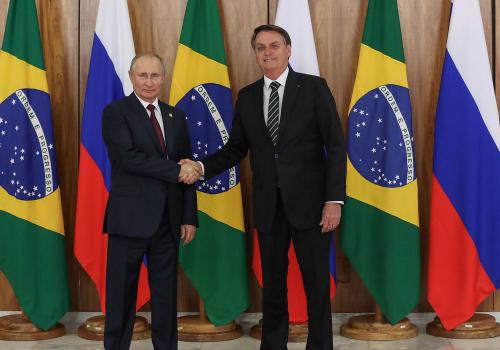Brazil and Russia are tightening energy relations amid the geopolitical turbulence and energy insecurity associated with the latter’s invasion of Ukraine. On Tuesday, Brazil’s President Jair Bolsonaro announced that around 35Ml of Russian diesel arrived in Santos port, São Paulo state, so far this year, which is 15% more than diesel imports from Russia last year, according to local oil and gas watchdog ANP. Bolsonaro – who will be competing in the second round of the presidential elections with Luiz Inácio Lula da Silva on October 30 – highlighted that new diesel shipments are expected for this month and that the imports will increase local competition and lower fuel prices. Relatively isolated in the West – having lost an ally in the White House after Donald Trump’s defeat in 2020 – Bolsonaro tried to strengthen relations with Russia. In February, on the eve of the invasion, Bolsonaro visited Vladmir Putin in Moscow to discuss bilateral partnerships. On the agenda was the acquisition of Petrobras’ nitrogen fertilizer unit UFN III by Russia’s Acron, but the negotiations between both companies failed. At the end of September, Brazilian nuclear energy company ENBPar and Russia’s Rosatom signed an MOU to facilitate conversations and actions on technology transfer for the formation of a cluster of companies providing nuclear sector services and supplies, and for the operation, repair, and modernization of hydroelectric plants. The MOU also allows Rosatom and ENBPar to expand the promotion of their areas of activity.
According to Nathana Garcez, a PhD student with the San Tiago Dantas graduate program and focused on energy geopolitics in the Caspian Sea, said it makes sense for Russia to seek closer ties with Brazil. "They are looking for other markets, diversifying, in view of their drastic reduction in oil and gas exports to Europe," she told BNamericas. Any pragmatic government in Brazil, on the other hand, would take advantage and try to close cheaper contracts with another supplier. "And this ends up working out well for the Bolsonaro government, which is trying to show the public that it is acting to reduce fuel prices," she said. Brazil currently produces around 3Mb/d (million barrels per day) of oil but its refining capacity totals only 2.3Mb/d. In 2021, the country imported 36Bl of oil derivatives, with the US accounting for 60% of the total. During the Lula administration, federal oil company Petrobras launched a business plan involving four new refineries – Abreu e Lima, Comperj, Premium I and Premium II. But after the Lava Jato corruption probe, most of the projects were halted. The exception was Abreu e Lima, or Rnest, but only one of the two refining trains originally projected were built. Petrobras has launched a revamp tender for the Pernambuco plant’s first refining train. Abreu e Lima is among the eight plants included in the firm’s refining divestment program, which the government claims will enhance competition in the downstream segment. The other refineries currently for sale are Presidente Getúlio Vargas (Repar), Alberto Pasqualini (Refap) and Gabriel Passos (Regap), in Paraná, Rio Grande do Sul and Minas Gerais states, respectively. The deals to sell the shale industrialization unit (SIX) to Forbes & Manhattan Resources, Isaac Sabbá refinery (Reman) to Atem Distribuidora, and Lubrificantes e Derivados do Nordeste (Lubnor) to Grepar Participações are pending approval from antitrust authority Cade. The Mataripe refinery (formerly Landulpho Alves) was the first to be sold and has been transferred to Acelen, of the Mubadala group.
